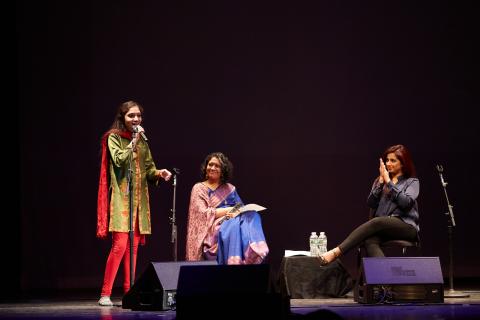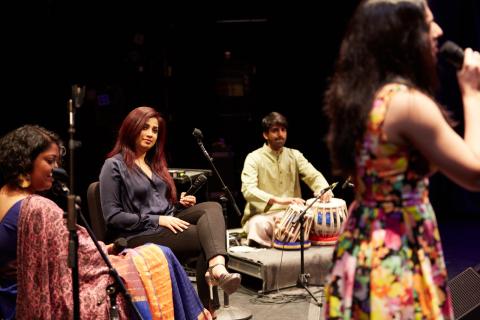Bollywood Superstar Shreya Ghoshal Gives Berklee Indian Ensemble Tips at Master Class

Shreya Ghoshal talks to guests seated in the Berklee Performance Center for a master class.
Image by Kelly Davidson

Student Shradha Ganesh from Toronto, Canada, sings as Shreya Ghoshal and Annette Philip, the director of the Berklee Indian Ensemble, listen.
Image by Kelly Davidson

Philip and Ghoshal listen as student Avanti Nagral, from Mumbai and Boston, sings. Giridaran Subramaniam, from Bengaluru, India, accompanies her on tabla.
Image by Kelly Davidson
The day before her sold-out show at the Berklee Performance Center, one of Bollywood's most revered playback singers, Shreya Ghoshal, conducted a master class in the concert hall. The event was part of Ghoshal's six-day residency with the Berklee India Exchange in early December.
As part of the class, five vocalists from the Berklee Indian Ensemble—Shradha Ganesh from Toronto, Canada; Gayathri Menon from Doha, Qatar; Avanti Nagral from Mumbai, India, and Boston, Massachusetts; Srishti Biyani from New Delhi, India; and Swarathmika Swaminathan from Mumbai, India—sang some of Ghoshal's iconic work for her and listened as the award-winning vocalist gave them invaluable feedback. They were joined on stage by Annette Philip, director of the ensemble, and accompanied by tabla player Giridaran Subramaniam. Below are some edited takeaways from that master class.
On Being in the Moment
"Once you have practiced your song, everything is done. At that moment, you are just enjoying, reacting to all of the piece… Don’t think too much. When I am on stage, I usually go into auto-cruise mode. Then, I don’t think. Even if I make a mistake, I let it go; I just improvise on it. It’s a very important thing to enjoy in that moment. Don’t think about the audience or who is reacting... You should have fun.”
On the Importance of Enunciation in Indian Music
"I have learned that [great Bollywood singers] have never let diction take a back seat. Ever. Clarity of words is something which is important in Indian music, the Indian style of singing, and film songs.”
On the Power of Simplicity
"One thing is expression of drama, another thing is musical expression, which sometimes you need not do too much. Simplicity also kind of hits you right in that point where you feel that ‘If I were to do anything excessive, it would have ruined it.’ So [you've got] to find the right balance—that thin line, where to not do, where to keep it simple.”
On Understanding a Song's Meaning
“I’ve learned from my seniors, my contemporaries, my composers, lyricists. Initially, earlier, when I started learning music, lyrics were not so important for me. I always used to learn the composition and lyrics didn’t matter. But now I’ve started realizing that if I’m not understanding them, my [performance] will fall flat.”
On Asking for What You Need on Stage
“That is one thing that you have to ask: 'Get my monitors right.' Get the right amount of everything that you need, at a sufficient level, and be prepared. And don’t hesitate, ever. I still sometimes feel very hesitant to ask, 'Can I have a bit more keys?' You feel like ‘I’m troubling someone’ to ask for it. If you are hesitant, your performance suffers, and you are at the center of the performance when you are singing on the stage.”
